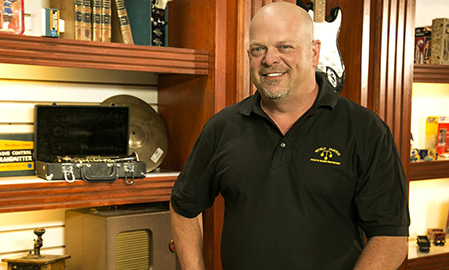Marketers of fish-oil-based cardiovascular drugs, at risk of swimming in the wake made by generics and dietary supplements, are making some waves of their own.
Amarin is poised to announce a celebrity tie-in with cable-TV star Rick Harrison (host of the show Pawn Stars) as part of an integrated campaign to boost awareness of its one-year-old Vascepa brand. And AstraZeneca, whose prescription omega-3 drug Epanova is a relative newcomer, recently launched an unbranded, digital edutainment effort.
Both drugs are approved as an adjunct to diet for treating very high triglycerides, but there are differences. Amarin wants to hit patients with the two-fold message that this is a serious condition and needs to be treated appropriately. The unique aspect of Vascepa is its ability to enable a robust reduction in trigs without causing an increase in LDL, or “bad,” cholesterol.
 “We think patients need to be educated both on identifying they have high trigs and then not being fooled by” the other products and dietary supplements that can increase LDL, Amarin president and CEO John Thero told MM&M in an interview.
“We think patients need to be educated both on identifying they have high trigs and then not being fooled by” the other products and dietary supplements that can increase LDL, Amarin president and CEO John Thero told MM&M in an interview.
Amarin’s partnership with Harrison, who was diagnosed with the condition, works the correlation between knowing trig-treatment facts and not being hoodwinked in his own pawn shop.
“If I hadn’t checked with my doctor, I would have made the mistake many make, thinking dietary supplement omega-3s are actually over-the-counter drugs,” Harrison says in a video on the related site LowerMyTrigs.com, adding that Pawn Stars teaches that “knowing what’s valuable and authentic is important to success.”
Meanwhile, in a campaign that takes its cue from the aquatic theme of DTC advertising done by GlaxoSmithKline’s Lovaza—but also departs from it—AZ posted three videos as part of an unbranded consumer effort called “Take it From a Fish.” The videos, dubbed “Love,” “Diet” and “Tri,” take the viewer into the seafood section of the grocery store as two talking fish carry on a casual conversation about healthy eating habits.
 They’re available on YouTube as well as on the unbranded consumer website TakeItFromaFish.com. AZ said 13 videos in all are planned, with several more batches scheduled to go live on YouTube in July. The website and videos were produced by the New York office of DigitasLBi.
They’re available on YouTube as well as on the unbranded consumer website TakeItFromaFish.com. AZ said 13 videos in all are planned, with several more batches scheduled to go live on YouTube in July. The website and videos were produced by the New York office of DigitasLBi.
The effort “combines education and entertainment to help patients and caregivers learn about very high triglycerides and how to incorporate healthy habits,” an AZ spokesperson told MM&M by email. Tips and videos will appear across digital channels including social media.
Amarin’s national awareness campaign, whose media launch is planned for Wednesday, will also include digital ads, media appearances by Harrison, a PSA, and a co-pay card that allows patients to get the drug for as low as $9 per month, said Aaron Berg, Amarin’s SVP of marketing and sales.
As a spokesman for the brand, Harrison’s likeness will show up in appropriate places. “We’re actually integrating it in many aspects of our promotion with our sales force,” he told MM&M. Makovsky is the AOR.
 The celebrity tie-in is the latest measure Amarin has taken to improve the launch trajectory of its drug, whose first-year sales were about $26.4 million. Amarin sought to get data on its label showing it can be used not only in those with severe (>500 mg/dL) hypertriglyceridemia but also patients whose triglycerides are merely elevated. Yet FDA advisors voted against the bid last year (the agency delayed its ruling). The firm then announced a co-promote with Kowa that bolstered Amarin’s sales force to a total of 380 reps.
The celebrity tie-in is the latest measure Amarin has taken to improve the launch trajectory of its drug, whose first-year sales were about $26.4 million. Amarin sought to get data on its label showing it can be used not only in those with severe (>500 mg/dL) hypertriglyceridemia but also patients whose triglycerides are merely elevated. Yet FDA advisors voted against the bid last year (the agency delayed its ruling). The firm then announced a co-promote with Kowa that bolstered Amarin’s sales force to a total of 380 reps.
Its latest efforts will be put to the test this year. In April Teva got approval for a generic version of Lovaza. That means the now off-patent GSK capsule, which had 2013 US sales of $1.1 billion, according to IMS data cited by Teva, is now available at a cut-rate price.
According to Leerink analyst Stephen Schwartz, for Lovaza and other omega-3 fatty acids like Epanova, an increase in LDL-C can often be titrated down with a statin. Moreover, prescribers of omega-3s are primary care doctors whom, he wrote in a December note, “may not be as aware of (or interested in) the nuances of Lovaza, Vascepa and Epanova clinical data.”
Lovaza is also indicated for treating very high trig levels but, according to Schwartz, the older med is often used in those afflicted with trigs between 200-500mg/dl, “partially because the FDA allowed Lovaza’s mixed dyslipidemia data to be shown on the label.”
In December (before the co-promote with Kowa was announced), Schwartz modeled $191 million in 2017 Vascepa sales, including projections of 2014, 2015 and 2016 revenue of $53 million, $72 million and $96 million, vs. consensus of $76 million, $121 million and $158 million. Industry analysts, on average, expect Epanova sales to reach about $322 million a year by 2018, according to Thomson Reuters Pharma.







